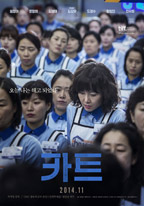

Ka-teu
South Korea 2014
Genre:
Drama
Director:
Boo Ji-young
Cast:
Yeom Jeong-ah
Moon Jeong-hee
Kim Yeong-ae
Kim Kang-woo
Do Kyeong-soo
Hwang Jeong-min
Cheon Woo-hee
Ji Woo
Lee Seung-joon
Park Soo-young
Song Ji-in

Cart
Story: It's been five years since Seon-hee (Yeom Jeong-ah) started working for a supermarket chain and her hard work is about to pay
off since she will soon sign a permanent employment contract. She really needs this, too, as she has to bring up her two children almost
on her own, her husband constantly being away from his family for months because of his work. But suddenly she gets fired along with countless other
employees. Hye-mi (Moon Jeong-hee) wants to defend her rights right away since this amounts to a breach of contract. She asks her colleagues to unite and
complain about the decision with the management. Although Seon-hee actually isn't interested in the position she is elected as on of the spokeswoman of the
fired female workers, along with Hye-mi and Soon-rye (Kim Yeong-ae). However, management completely ignores the wish of its employees to discuss the decision.
The women still have one month at their old job, so they decide to go on a strike. Dong-joon (Kim Kang-woo) is trying hard to act as an agent between the
two parties, but the battle lines are already drawn. And no one seems to care about the fate of the female workers...
Review: "Cart" is based on true events that took place during 2007, which is why the socio-critical aspect of the movie clearly stands in the
foreground. Also, the film deserves some credit for working within a small frame and aiming at appealing to the viewer on an emotional level. Still, exactly
the latter point turns out to be one of the flick's biggest flaws. Too often the drama proves to be manipulative and - which is even worse - generic. You get
the feeling as if "Cart" was shot while ticking off a list what needs to be put into a movie about labor rights. Furthermore, the women are drawn too poorly,
although it is easy to relate to them. In the end this amounts to an entertaining drama, but the movie's message gets lost somewhere in a seemingly trivial
screenplay.

Seon-hee, fantastically played by Yeom Jeong-ah ("Spy", "A Tale of Two Sisters"), is an always
hard working and also a bit submissive worker who undergoes a strong, but believable change of character, because of the injustice she is confronted
with. She is also the only person whose private life is examined a bit. Her son even gets his own story, which nonetheless is tied up to the main story in the
end. Unfortunately, it is obvious from the very beginning that this subplot is only a way of reitering the main story and creating an understanding of the son
for his desperate mother and her struggle. Yet, this insertion enriches the movie since the other characters sadly all look rather blurry.

This also applies to Moon Jeong-hee's ("Hide and Seek", "Deranged") character, who fighting at the
front line temporarily acts differently than we would expect of her. Her reasons are comprehensible, but the feeling remains that her character would have
deserved a more vivid individual story. Moreover, it's also disappointing that you get the impression "Cart" would center around the labor rights of women in
particular when suddenly the likeable manager turns up, played by Kim Kang-woo ("Tabloid Truth",
"The Taste of Money"). Someone who at the last possible moment is supposed to clarify that the movie doesn't deal with a
gender-specific problem, but with the rights of workers in Korea in general. In fact, this is an important note, but we have been set on the wrong track
for too long already.
Female director Boo Ji-young ("Sisters on the Road") draws a hopeless fight of helpless employees against money-hungry men in leadership positions and does so
not just on an one-dimensional level. The workers often need to ask themselves how much they are willing to sacrifice in order to fight for justice. After all,
the whole family suffers from missing earnings. Furthermore, with Dong-joon there is at least one guy among the superiors who isn't really happy with the
developments, but he won't risk losing his own position and accordingly supports the women in only a very passive way until he is affected by the cost cuts
of the bosses himself. The picture depicted is thus quite a sophisticated one, although in the end it is clearly emphasized that South Korea still has
considerable shortcomings concerning their labor rights and the right of demonstration, which should have been eradicated in a modern democratic country
a long time ago.

Apart from several mandatory dramatic scenes, including an older woman and after that a little child ending up in hospital because the demonstrations of the female workers are constantly broken up by the police and a group of henchmen, it's particularly the last scene that proves to feature too much pathos and turns out to be almost ridiculous because of the use of slow-motion. Maybe the life-affirming nature of "Cart", which on several occasions is disrupted by not that well written drama, should have been replaced by a grittier tone. Moreover, at least Hye-mi and Dong-joon would have deserved their own little stories in order to provide the drama with the necessary groundwork. The way it is "Cart" often stays too much on the surface and deals with a topic, which deserves more attention, in a simply too insignificant and almost cliché-ridden manner.

Disclaimer

















